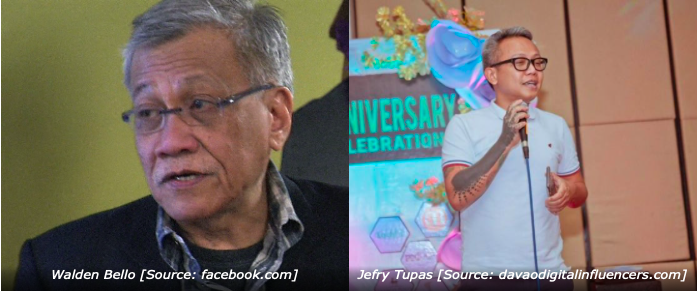|
All Global Research articles can be read in 51 languages by activating the “Translate Website” drop down menu on the top banner of our home page (Desktop version).
To receive Global Research’s Daily Newsletter (selected articles), click here.
Follow us on Instagram and Twitter and subscribe to our Telegram Channel. Feel free to repost and share widely Global Research articles.
***
On Saturday, August 6, Secretary of State Antony Blinken met with Philippines President Ferdinand Marcos, Jr., in Manila and pledged greater U.S. military support for the Philippines because of “rising tensions in Asia, including those involving China and Taiwan.”
In a press conference following the meeting, Blinken emphasized the Biden administration’s commitment to working collaboratively with the Philippines to “defend the rule of law, protect human rights and fundamental freedoms—including freedom of expression.”
Blinken was noticeably silent two days after his visit, however, when Filipino authorities arrested Walden Bello, a renowned scholar and former vice-presidential candidate, on charges of cyber-libel.
These charges had originally been filed against him by a former Davao City employee, Jefry Tupas, whom Bello reportedly called a “drug dealer.”

Tupas had worked under Davao City Mayor Sara Duterte-Carpio—the daughter of former President Rodrigo Duterte (2016-2022) and current Filipino Vice-President —and attended a party where ₱1.5 million worth of illegal drugs were seized.
Speaking to the media present at his arrest, Bello—who has been released on bail—said that he was “innocent of the charges,” and that its only been a few weeks but the new Filipino administration was “already showing its fangs.”
Since Marcos Jr. took over in May, the websites of several progressive media organizations in the Philippines have been banned and, in July, a conviction against the online news platform Rappler for cyber-libel was upheld by the Court of Appeals.
Laban ng Masa—the socialist coalition that Bello leads—said that Bello’s arrest “speaks volumes on the state of democracy and freedom in the Philippines. It also serves as a warning to democracy and human rights advocates on what would befall them while standing up for the right to express one’s views and criticize wrongdoings by the rich and powerful.”[1]
Joseph Gerson, Director of the Committee for a SANE U.S. China policy, wrote in a letter to the Philippines ambassador to the U.S., José Manuel del Gallego Romualdez, that “the arrest of this Vice-Presidential candidate [Bello] appears to be an act of retribution by Vice President Duterte against her opponent in the recent election. It also appears to be designed to serve a chilling warning to democracy and human rights advocates at the time when the son of former dictator Marcos assumes power in the Philippines.”
Back-to-the-Future Nightmare
Filipinos today find themselves living in a back-to-the-future nightmare with Ferdinand Marcos, Jr., as their president.
From 1965 to 1986, Ferdinand Marcos, Sr., ruled the Philippines with an iron fist, detaining more than 53,000 people and killing upwards of 3,200 after martial law was declared.[2]
A secret 1969 CIA report on Marcos stated that he and his wife Imelda had stolen “funds ranging from not lower than several hundred million U.S. dollars to two billion U.S. dollars”—much of which was hidden away in CIA banks in Hawaii (Bishop, Baldwin, Rewald, Dillingham & Wong) and Australia (Nugan Hand).[3]
According to journalist Sterling Seagrave, Marcos Sr. first worked for the CIA in the 1950s as a congressman when he participated in a CIA-engineered rebellion against Indonesia’s socialist President Sukarno.
The CIA subsequently assisted Marcos in his rise to the presidency, writing a phony biography that made him into a war hero, while training his police forces to repress all opposition.[4]
Marcos was valued because he provided the U.S. with air bases that were used to bomb Vietnam while supplying Filipino troops to Vietnam and opening the Philippines’ economy to U.S. corporations.[5]
Today, Marcos’s son—who called the period of martial law under his father a “golden age in Philippines history”—is valued by the U.S. for similar reasons.
During Mr. Blinken’s visit, he and Marcos Jr. spoke of deepening the economic relationship and building on the mutual defense arrangement between the U.S. and the Philippines.
The New York Times reported that “the two countries are treaty allies, and the U.S. military has long maintained a presence in the Philippines. American officials have been discussing possible greater access to military bases in the country, doing more exercises between the two militaries and making their defense systems more interoperable—part of Washington’s Indo-Pacific strategy aimed at increasing cooperation with allies and partners to counterbalance China.”
Marcos Jr. has earned particular plaudits from the U.S. for his pledge to uphold the ruling by an international court at The Hague rejecting China’s claims to territorial control over waters and land in the South China Sea where the Philippines and Taiwan have competing claims.
Marcos’s predecessor, Rodrigo Duterte, had tried to adopt more conciliatory policies toward China, including backing down from territorial assertions over the South China Sea, while also threatening to end an important military agreement with the U.S.
Duterte was best known for the excesses of his War on Drugs, which the Marcos-Duterte regime is expected to continue.
Bello’s arrest is another marker of Philippines’ rising authoritarianism, which undercuts the official purpose of the New Cold War; namely to advance democracy against China’s authoritarianism. No wonder then that Mr. Blinken was silent.
*
Note to readers: Please click the share buttons above or below. Follow us on Instagram and Twitter and subscribe to our Telegram Channel. Feel free to repost and share widely Global Research articles.
Jeremy Kuzmarov is Managing Editor of CovertAction Magazine. He is the author of four books on U.S. foreign policy, including Obama’s Unending Wars (Clarity Press, 2019) and The Russians Are Coming, Again, with John Marciano (Monthly Review Press, 2018). He can be reached at: [email protected].
Notes
Featured image: Walden Bello in 2007 (By Socy major, licensed under the Public Domain)
|